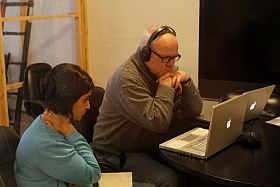


Being a Tutor…

And there you are – hello, nice to meet you and you are the one with which project? A situation many documentary tutor colleagues will recognise from the extraordinary many documentary workshops in and outside Europe, set up for local and EU money through the MEDIA Programme or other international organisations. I have done this job for a couple of decades, it is not easy and I am still not sure that I am doing it in the right way. I know when I have given some help, and I know when I did not help. More or less at least.
And what is this job? Well you read project proposals, watch teasers (also called tasters, a better word maybe?) and other material and you talk. Yes, you talk a lot. You ask questions, the filmmakers ask questions. You listen, they listen. You try to be honest in your evaluation, you don’t want to discourage, on the other hand you don’t want to encourage and give false hopes.
It is mostly easy when you meet filmmakers you know and with whom you have had the dialogue many times before. They know what you are good at, and you know what they are good at. You have seen their previous work, you have maybe written about it on your blog – you don’t need a lot of introduction, you can go directly to the film project… and there are definitely people who don’t want to talk to you
because the chemistry is not there, they don’t find you professional, you don’t like their films or their approach to filmmaking.
But if you have not met the filmmakers in beforehand… Iate February I was at a well organised 3 day documentary workshop in Beirut with 7 interesting projects from different Arabic countries at different levels of development. Some were ready for production, some close to starting the editing, some had developed the project and had eventually some material to show and/or a teaser. And some were at the idea stage.
So how to tutor, how to give feedback that inspires and is constructive, how to push a process in the right direction. When you don’t know the person(s) who sit in front of you. Which was the case for the major part of the filmmakers attending.
Yes, what is the right direction? The one that leads the filmmaker to make what he/she is aiming for? Or the one that you could imagine would be good market-wise, that opens up for a wider audience?
We were four tutors with different backgrounds, which of course gave different pieces of advice for the filmmakers to digest and reflect upon. Did they get confused – of course they did, hopefully in a creative way!
In this case, in Beirut, I also met some stories with a historical and cultural background that was very far from my hemisphere. You can google a lot in beforehand to understand more but when you sit there with the filmmaker there is always something that you have not understood. And politics and culture and history is not that easy in the Middle East!
We had 90 minutes slots to be with the filmmakers in Beirut. Good time to talk about the project AND about many other things that have to do with your life. It is my simple philosophy that you have to know the person just a little bit better than what the cv in the catalogue gives you, you have to create an atmosphere where you can talk freely and openly. They expect that you are professional, know how to analyse a project, know how to get to the core of a project – and the tutor expects an equal professionalism, be it from a filmmaker who has just graduated from film school, or a journalist who was to make documentaries, or an autodidact.
… you leave a workshop like this and many others with many doubts. Did you fall into the trap making suggestions for the film project that were more in the direction that you could see the film and not in the way of the director? Were you making your film? Were you listening to what was being said from the filmmaker? Were you lecturing rather than having a dialogue? Did you encourage rather than discourage? Were you honest or did you hide critical remarks behind politeness?
Is there a recipe for being a tutor? Is there a list of points to remember? Probably, I know that there are workshops for tutors to be better. I have never attended, probably a mistake, but basically I think the most important qualification is the ability to change the way of talking and proceding according to the person(s) you sit with.
Did I forget to say that you of course need to be prepared (read the proposal, analysed it, watched material, eventually watched previous work, checked the history/culture behind the proposal) for the dialogue. And please be humble, you are not the filmmaker!
The photo presents the tutor at work next to talented Egyptian director Nadine Salib, one of seven participants at the AFAC workshop in Beirut, see previous text “Afac and Documentaries”.